Fleurs du Mal Magazine


Or see the index
An inspirational work of wisdom, warmth, and generosity from a three-term US poet laureate.
“To know ourselves is the most profound and difficult endeavor. Though we are all made of the same questions, we have individual routes to the answers, or to reframing the questions. Why is there evil in the world? Why do people suffer, and some more than others? Why are we here? What are we doing here? What happens after death? Does anything mean anything at all? Who am I and what does it matter?” writes Joy Harjo, renowned poet and activist, in this profound work about the struggles, challenges, and joys of coming of age.
 In her best-selling memoir Poet Warrior, Harjo led readers through her lifelong process of artistic evolution. In Girl Warrior, she speaks directly to Native girls and women, sharing stories about her own coming of age to bring renewed attention to the pivotal moments of becoming including forgiveness, failure, falling, rising up, and honoring our vast family of beings.
In her best-selling memoir Poet Warrior, Harjo led readers through her lifelong process of artistic evolution. In Girl Warrior, she speaks directly to Native girls and women, sharing stories about her own coming of age to bring renewed attention to the pivotal moments of becoming including forgiveness, failure, falling, rising up, and honoring our vast family of beings.
Informed by her own experiences and those of her ancestors, Harjo offers inspiration and insight for navigating the many challenges of maturation. She grapples with parents, friendships, love, and loss. She guides young readers toward painting, poetry, and music as powerful tools for developing their own ethical sensibility. As Harjo demonstrates, the act of making is an essential part of who we are, a means of inviting the past into the present and a critical tool young women can use to shape a more just future. Lyrical and compassionate, Harjo’s call for creativity and empathy is an urgent and necessary work.
Joy Harjo is an internationally renowned poet, performer, and writer of the Muscogee (Creek) Nation and served three terms as the 23rd Poet Laureate of the United States. Harjo is the author of ten books of poetry, several plays, children’s books, and two memoirs; she has also produced seven award-winning music albums and edited several anthologies. Her many honors include the Ruth Lily Prize from the Poetry Foundation, the Academy of American Poets Wallace Stevens Award, two NEA fellowships, a Guggenheim Fellowship, and a Tulsa Artist Fellowship. She is a chancellor of the Academy of American Poets and Board of Directors Chair of the Native Arts & Cultures Foundation. She lives in Tulsa, Oklahoma, where she is the inaugural Artist-in-Residence for the Bob Dylan Center.
Girl Warrior: On Coming of Age
by Joy Harjo (Author)
Publisher: W. W. Norton & Company
Publication date: October 7, 2025
Language: English
Print length: 176 pages
ISBN-10:1324094176
ISBN-13:978-1324094173
October 7, 2025
Hardcover
$ 21.99
Euro 18,69
• fleursdumal.nl magazine
More in: #Archive Native American Library, - Book News, - Bookstores, Archive G-H, Archive G-H, Joy Harjo
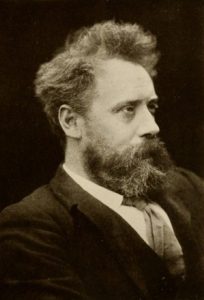
Invictus
Out of the night that covers me,
Black as the pit from pole to pole,
I thank whatever gods may be
For my unconquerable soul.
In the fell clutch of circumstance
I have not winced nor cried aloud.
Under the bludgeonings of chance
My head is bloody, but unbowed.
Beyond this place of wrath and tears
Looms but the Horror of the shade,
And yet the menace of the years
Finds and shall find me unafraid.
It matters not how strait the gate,
How charged with punishments the scroll,
I am the master of my fate,
I am the captain of my soul.
William Ernest Henley
(1849—1903)
Invictus
• fleursdumal.nl magazine
More in: Archive G-H, Archive G-H, Henley, William Ernest
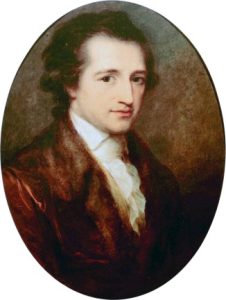
Der Sänger
Was hör ich draußen vor dem Tor,
Was auf der Brücke schallen?
Laß den Gesang vor unserm Ohr
Im Saale widerhallen!
Der König sprachs, der Page lief;
Der Knabe kam, der König rief:
Laßt mir herein den Alten!
Gegrüßet seid mir, edle Herrn,
Gegrüßt ihr, schöne Damen!
Welch reicher Himmel, Stern bei Stern!
Wer kennet ihre Namen?
Im Saal voll Pracht und Herrlichkeit
Schließt, Augen, euch; hier ist nicht Zeit,
Sich staunend zu ergetzen.
Der Sänger drückt’ die Augen ein
Und schlug in vollen Tönen;
Die Ritter schauten mutig drein,
Und in den Schoß die Schönen.
Der König, dem das Lied gefiel,
Ließ, ihn zu ehren für sein Spiel,
Eine goldne Kette holen.
Die goldne Kette gib mir nicht,
Die Kette gib den Rittern,
Vor deren kühnem Angesicht
Der Feinde Lanzen splittern;
Gib sie dem Kanzler, den du hast,
Und laß ihn noch die goldne Last
Zu andern Lasten tragen.
Ich singe, wie der Vogel singt,
Der in den Zweigen wohnet;
Das Lied, das aus der Kehle dringt,
Ist Lohn, der reichlich lohnet.
Doch darf ich bitten, bitt ich eins:
Laß mir den besten Becher Weins
In purem Golde reichen.
Er setzt’ ihn an, er trank ihn aus:
O Trank voll süßer Labe!
O wohl dem hochbeglückten Haus,
Wo das ist kleine Gabe!
Ergehts euch wohl, so denkt an mich,
Und danket Gott so warm, als ich
Für diesen Trunk euch danke.
Johann Wolfgang von Goethe
(1749-1832)
Der Sänger
•fleursdumal.nl magazine
More in: # Music Archive, Archive G-H, Archive G-H, Goethe, Johann Wolfgang von, J.W. von Goethe
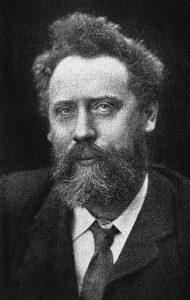
I Am The Reaper
I am the Reaper.
All things with heedful hook
Silent I gather.
Pale roses touched with the spring,
Tall corn in summer,
Fruits rich with autumn,
and frail winter blossoms—
Reaping, still reaping—
All things with heedful hook
Timely I gather.
I am the Sower.
All the unbodied life
Runs through my seed-sheet.
Atom with atom wed,
Each quickening the other,
Fall through my hands,
ever changing, still changeless.
Ceaselessly sowing,
Life, incorruptible life,
Flows from my seed-sheet.
Maker and breaker,
I am the ebb and the flood,
Here and Hereafter,
Sped through the tangle and coil
Of infinite nature,
Viewless and soundless
I fashion all being.
Taker and giver,
I am the womb and the grave,
The Now and the Ever
William Ernest Henley
(1849—1903)
I Am The Reaper
• fleursdumal.nl magazine
More in: Archive G-H, Archive G-H, Henley, William Ernest
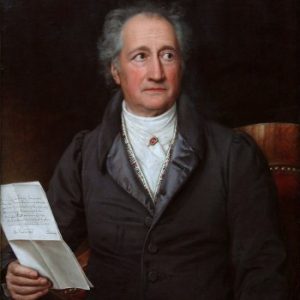
Eins und Alles
Im Grenzenlosen sich zu finden,
Wird gern der Einzelne verschwinden,
Da löst sich aller Überdruß;
Statt heißem Wünschen, wildem Wollen,
Statt läst’gem Fordern, strengem Sollen
Sich aufzugeben ist Genuß.
Weltseele, komm’ uns zu durchdringen!
Dann mit dem Weltgeist selbst zu ringen
Wird unsrer Kräfte Hochberuf.
Teilnehmend führen gute Geister,
Gelinde leitend, höchste Meister,
Zu dem, der alles schafft und schuf.
Und umzuschaffen das Geschaffne,
Damit sich’s nicht zum Starren waffne,
Wirkt ewiges lebend’ges Tun.
Und was nicht war, nun will es werden
Zu reinen Sonnen, farbigen Erden,
In keinem Falle darf es ruhn.
Es soll sich regen, schaffend handeln,
Erst sich gestalten, dann verwandeln;
Nur scheinbar steht’s Momente still.
Das Ewige regt sich fort in allen:
Denn alles muß in Nichts zerfallen,
Wenn es im Sein beharren will.
Johann Wolfgang von Goethe
(1749-1832)
Eins und Alles
•fleursdumal.nl magazine
More in: Archive G-H, Archive G-H, Goethe, Johann Wolfgang von, J.W. von Goethe

Philine
Singet nicht in Trauertönen
Von der Einsamkeit der Nacht!
Nein, sie ist, o holde Schönen,
Zur Geselligkeit gemacht.
Wie das Weib dem Mann gegeben
Als die schönste Hälfte war,
Ist die Nacht das halbe Leben,
Und die schönste Hälfte zwar.
Könnt ihr euch des Tages freuen,
Der nur Freuden unterbricht?
Er ist gut, sich zu zerstreuen;
Zu was anderm taugt er nicht.
Aber wenn in nächt′ger Stunde
Süßer Lampe Dämmrung fließt,
Und vom Mund zum nahen Munde
Scherz und Liebe sich ergießt;
Wenn der rasche lose Knabe,
Der sonst wild und feurig eilt,
Oft bei einer kleinen Gabe
Unter leichten Spielen weilt;
Wenn die Nachtigall Verliebten
Liebevoll ein Liedchen singt,
Das Gefangnen und Betrübten
Nur wie Ach und Wehe klingt:
Mit wie leichtem Herzensregen
Horchet ihr der Glocke nicht,
Die mit zwölf bedächt′gen Schlägen
Ruh′ und Sicherheit verspricht!
Darum an dem langen Tage
Merke dir es, liebe Brust:
Jeder Tag hat seine Plage,
Und die Nacht hat ihre Lust.
Johann Wolfgang von Goethe
(1749-1832)
Philine
•fleursdumal.nl magazine
More in: Archive G-H, Archive G-H, Goethe, Johann Wolfgang von, J.W. von Goethe
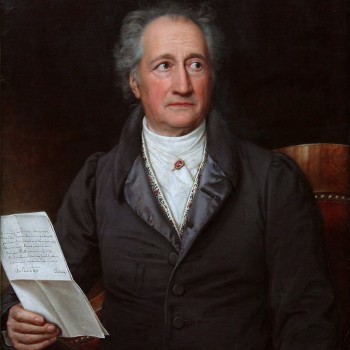
Totentanz
Der Türmer, der schaut zu Mitten der Nacht
Hinab auf die Gräber in Lage;
Der Mond, der hat alles ins Helle gebracht;
Der Kirchhof, er liegt wie am Tage.
Da regt sich ein Grab und ein anderes dann:
Sie kommen hervor, ein Weib da, ein Mann,
In weißen und schleppenden Hemden.
Das reckt nun, es will sich ergetzen sogleich,
Die Knöchel zur Runde, zum Kranze,
So arm und so jung, und so alt und so reich;
Doch hindern die Schleppen am Tanze.
Und weil hier die Scham nun nicht weiter gebeut,
Sie schütteln sich alle, da liegen zerstreut
Die Hemdlein über den Hügeln.
Nun hebt sich der Schenkel, nun wackelt das Bein,
Gebärden da gibt es vertrackte;
Dann klippert’s und klappert’s mitunter hinein,
Als schlüg’ man die Hölzlein zum Takte.
Das kommt nun dem Türmer so lächerlich vor;
Da raunt ihm der Schalk, der Versucher, ins Ohr:
Geh! hole dir einen der Laken.
Getan wie gedacht! und er flüchtet sich schnell
Nun hinter geheiligte Türen.
Der Mond, und noch immer er scheinet so hell
Zum Tanz, den sie schauderlich führen.
Doch endlich verlieret sich dieser und der,
Schleicht eins nach dem andern gekleidet einher,
Und, husch, ist es unter dem Rasen.
Nur einer, der trippelt und stolpert zuletzt
Und tappet und grapst an den Grüften;
Doch hat kein Geselle so schwer ihn verletzt,
Er wittert das Tuch in den Lüften.
Er rüttelt die Turmtür, sie schlägt ihn zurück,
Geziert und gesegnet, dem Türmer zum Glück,
Sie blinkt von metallenen Kreuzen.
Das Hemd muß er haben, da rastet er nicht,
Da gilt auch kein langes Besinnen,
Den gotischen Zierat ergreift nun der Wicht
Und klettert von Zinne zu Zinnen.
Nun ist’s um den armen, den Türmer getan!
Es ruckt sich von Schnörkel zu Schnörkel hinan,
Langbeinigen Spinnen vergleichbar.
Der Türmer erbleichet, der Türmer erbebt,
Gern gäb er ihn wieder, den Laken.
Da häkelt – jetzt hat er am längsten gelebt –
Den Zipfel ein eiserner Zacken.
Schon trübet der Mond sich verschwindenden Scheins,
Die Glocke, sie donnert ein mächtiges Eins,
Und unten zerschellt das Gerippe.
Johann Wolfgang von Goethe
(1749-1832)
Totentanz
•fleursdumal.nl magazine
More in: Archive G-H, Archive G-H, Goethe, Johann Wolfgang von, J.W. von Goethe

Neue Liebe, neues Leben
Herz, mein Herz, was soll das geben?
Was bedränget dich so sehr?
Welch ein fremdes, neues Leben !
Ich erkenne dich nicht mehr.
Weg ist alles was du liebtest,
Weg, warum du dich betrübtest,
Weg dein Fleiß und deine Ruh –
Ach, wie kamst du nur dazu !
Fesselt dich die Jugendblüte,
Diese liebliche Gestalt,
Dieser Blick voll Treu und Güte
Mit unendlicher Gewalt?
Will ich rasch mich ihr entziehen,
Mich ermannen, ihr entfliehen,
Führet mich im Augenblick,
Ach, mein Weg zu ihr zurück.
Und an diesem Zauberfädchen,
Das sich nicht zerreißen lässt,
Hält das liebe lose Mädchen
Mich so wider Willen fest;
Muss in ihrem Zauberkreise
Leben nun auf ihre Weise.
Die Veränderung, ach, wie groß!
Liebe! Liebe! Laß mich los!
Johann Wolfgang von Goethe
(1749-1832)
Neue Liebe, neues Leben
•fleursdumal.nl magazine
More in: Archive G-H, Archive G-H, Goethe, Johann Wolfgang von, J.W. von Goethe
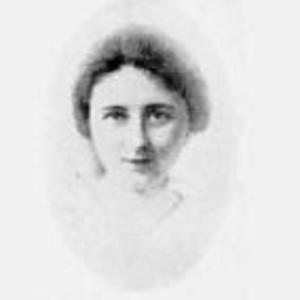
Lie-a-bed
My darling lies down
in her soft white bed,
And she laughs at me.
Her laughter has flushed
her pale cheeks with red.
Her eyes dance with glee.
My darling lies close
in her warm white bed,
And she will not rise.
I will shower kisses
down on her sleepyhead
Till she close her eyes.
Gioja’s no happier fresh
from the South.
But my kisses free
Will straiten the curves of
this teasing mouth,
If it laughs at me.
Lesbia Harford
(1891-1927)
Lie-a-bed
• fleursdumal.nl magazine
More in: Archive G-H, Archive G-H, Feminism, Harford, Lesbia, Workers of the World

Bluebird
there’s a bluebird in my heart that
wants to get out
but I’m too tough for him,
I say, stay in there, I’m not going
to let anybody see
you.
there’s a bluebird in my heart that
wants to get out
but I pour whiskey on him and inhale
cigarette smoke
and the whores and the bartenders
and the grocery clerks
never know that
he’s
in there.
there’s a bluebird in my heart that
wants to get out
but I’m too tough for him,
Lesbia Harford
(1891-1927)
Bluebird
• fleursdumal.nl magazine
More in: Archive G-H, Archive G-H, Feminism, Harford, Lesbia, Workers of the World

My window pane is broken
My window pane is broken
Just a bit
Where the small curtain doesn’t
Cover it.
And in the afternoon
I like to lie
And watch the pepper tree
Against the sky.
Pink berries and blue sky
And leaves and sun
Are very fair to rest
One’s eyes upon.
And my tired feet are resting
On the bed
And there’s a pillow under
My tired head.
Parties and balls and books
I know are best
But when I’ve finished work
I like to rest.
Lesbia Harford
(1891-1927)
My window pane is broken
• fleursdumal.nl magazine
More in: Archive G-H, Archive G-H, Feminism, Harford, Lesbia, Workers of the World

Machinist’s Song
The foot of my machine
Sails up and down
Upon the blue of this
fine lady’s gown.
Sail quickly, little boat,
With gifts for me,
Night and the goldy
streets and liberty.
Lesbia Harford
(1891-1927)
Machinist’s Song
• fleursdumal.nl magazine
More in: Archive G-H, Archive G-H, Harford, Lesbia, Workers of the World
Thank you for reading Fleurs du Mal - magazine for art & literature